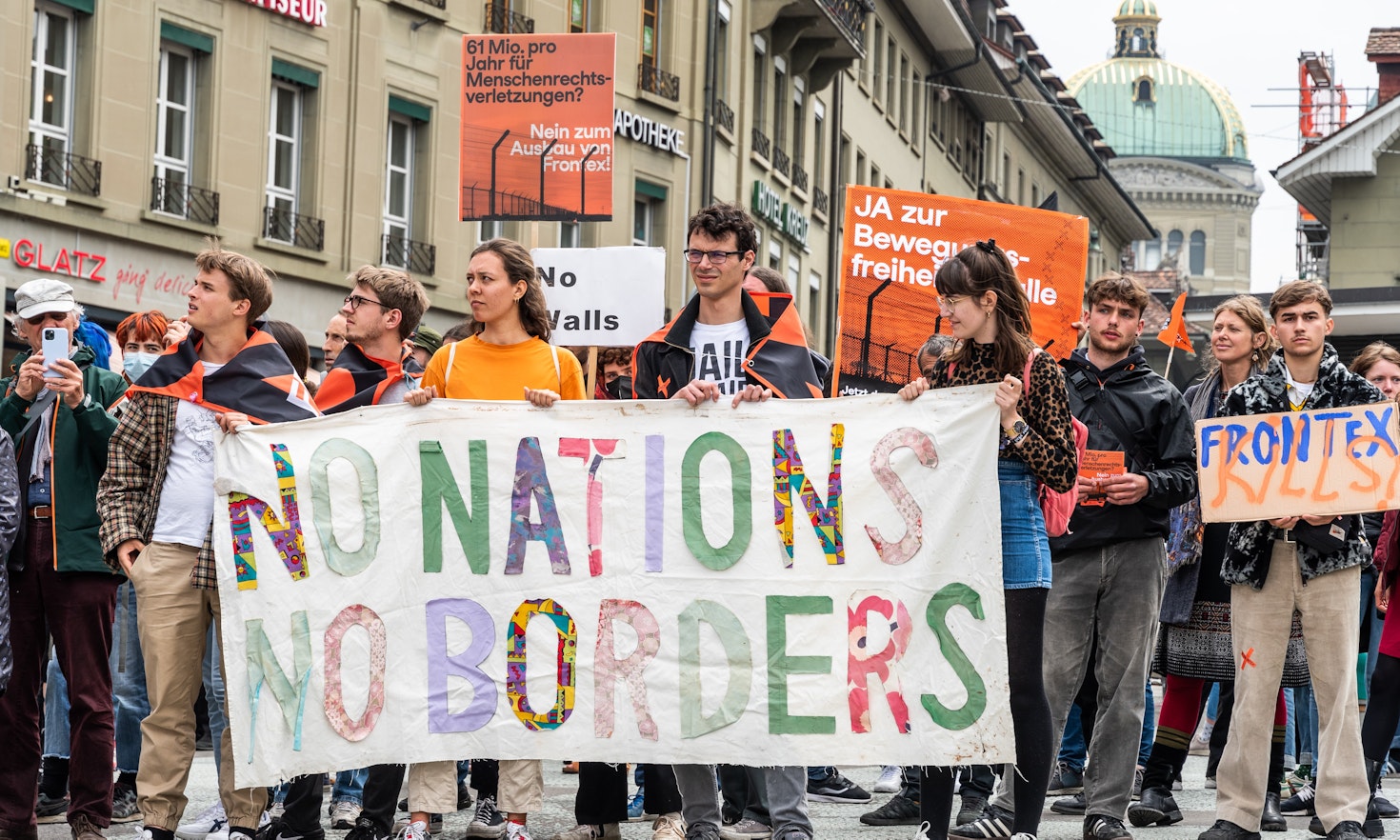
Le migrazioni nella campagna elettorale italiana 2022
 Giorgia Bulli
Giorgia Bulli
The Abolish Frontex campaign group led a week of action between the 10th and 18th of December 2022 to revoke the EU’s Nobel Peace Prize, 10 years after its award. Whilst the recognition was for what the EU, ‘over six decades, contributed to the advancement of peace and reconciliation, democracy and human rights in Europe’, the anniversary constituted an opportunity to offer a counternarrative to the dominant view of the EU as a peace-promoting, democratic project.
Abolish Frontex’s week of action sought to portray an alternative story, voice, and perspective of the marginalised migrants seeking refuge in the EU to the dominant view of the EU as a peace-promoting democratic project. This strategy - adopted by grassroots social movements across the world and throughout history - recognises how collective memories are often charged with political and social ideas of the past but are used to provide a framework for understanding the present. Sociologist Timothy Kubal underlines that, ‘while there is always disagreement about how to remember the past, institutionalization sometimes shapes remembering into its simplest and least controversial form; in these cases, a consensus collective memory appears.’ Considering this, the week of action seized on the anniversary, situated between International Human Rights Day and International Migration Day, and sought to expose the hypocrisy of the EU and its member states who are waging a brutal war against people trying to cross the borders into European territory. Through a wide range of activities – including postering and reclaiming selected public spaces in different European countries, film screenings and theatre pieces, and finally holding a destitution ceremony on the 18th, at the heart of the EU institutions in Brussels, comprised of members from different movements – they highlighted how,
“peace is not just about the absence of war, but also about social peace, economic and financial ethics, the reception of people migrating and the respect of human rights for everybody.”
This links with the broader essence of the campaign which aims to draw attention to the colonial roots of the EU project and the neoliberal framework in which it continues to operate. Furthermore, it advances the ultimate objective of eradicating Frontex – the EU Border Agency – and thereafter redirect its funding into, for example, a low carbon economy and regularising people who don’t have papers.
Although the EU’s migration and asylum policies are, theoretically, rooted in the 1951 Convention Relating to the Status of Refugees and the Geneva Convention, an agreement founded on the Universal Declaration of Human Rights, the last decade has seen increasingly harsh policies and attitudes towards migrants seeking protection in Europe. Since the onset of the so-called “European migration crisis” in 2015, the EU has responded by reinforcing the powers of the agencies, such as Frontex, concerned with border control. Operation Mare Nostrum – the original air and naval operation launched by the Italian government to save people migrating in the Mediterranean – was quickly replaced by Frontex’s Operation Triton, whose guiding principle was to secure the EU’s external borders. Since then, policies based on securitisation, surveillance and externalisation have been rapidly developed supporting and defending Fortress Europe, at great capital and human cost. Indeed, Frontex’s budget has grown from 6 million euros in 2005 to 754 million in 2022, as stated on the agency’s website, making it the largest and most funded EU partner. Additionally, the International Organisation for Migration (IOM)’s Missing Migrants Project has registered over 51,000 migrants missing since 2014 in the region.
Despite some of the activities taking place on behalf of the EU, with policy changes being covered by the media and thus known by the general public, there is an enormous lack of transparency regarding the treatment migrants encounter across Europe. A recent Lighthouse Report reveals the existence of some of Europe’s “black sites” – hidden detention centres holding migrants and denying them the right to seek asylum prior to illegally pushing them back across the borders. These were identified specifically in Bulgaria, Hungary, and Croatia. Activist and author Matthias Monroy has recently also revealed how, in line with the Italy-Libya Memorandum established in 2017 and renewed in November 2022, the EU has withdrawn its ships from the Mediterranean and is now investing in aerial surveillance instead, allowing the Libyan Coast Guard to do the “dirty work”. He calls this “airborn complicity”, as boats in distress are less likely to be rescued and brought to shore but instead are taken back to the detainment camps in Libya. In 2022, 60,000 migrants from over 40 countries were registered in Libya, living under conditions that violate human rights.
These are some of the reasons that motivate Abolish Frontex’s campaign and the week of action. Whilst the group’s objectives seemed radical a year ago, the war in Ukraine reveals that the EU does have the resources, ability and space to provide aid and support to refugees at the border: at the start of the war, over 3 million Ukrainians were processed at the border in the space of 3 weeks – welcomed with hot chocolate and blankets. Bordering Poland and Belarus, the Ukrainians were met by a completely different attitude and welcome to what the Iraqis, Syrians and Afghans crossing the very same space received just a few months earlier, in what became known as the “Belarus-EU Border Crisis 2021-2022”. The hypocrisy of this differential treatment suggests that the EU upholds human rights for white, Christian Europeans.
No Nobel Peace Prize has thus far been revoked, and the campaign knows that this is not the objective of the week of action. Instead, what the campaign sought to do was to provide a means for presenting a more comprehensive view of the EU’s history and contemporary practice by including the voices and experiences of those it tries so hard to exclude. In this way, it contributed to Abolish Frontex’s overall aim of dismantling the border-industrial complex by reclaiming the narrative and educating and involving people from wherever they originated.

This content is licensed under a Creative Commons Attribution 4.0 International license.